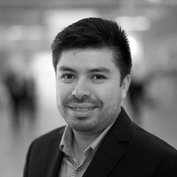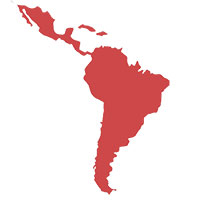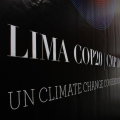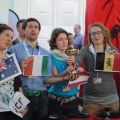Excerpts of Pulgar-Vidal’s Stocktaking Remarks
Andres Fuentes | December 11, 2014.
The negotiations on the decision for a text towards 2015 have stalled as evening approached in Lima. The debate centred around how to move forwards with the actual discussions, with the G77+China pushing to have further debate.
It was at this time that the president of the conference, Manuel Pulgar-Vidal, summoned a stocktaking session to get an update and provide direction moving forward. However, what is usually a dull session was turned into an electrifying injection of urgency and determination by the magnetic Pulgar-Vidal. His speech was a clarion call to delegates to come together and find consensus amidst conflict, agreement amidst anger.
Met with raucous and protracted applause from the clearly invigorated delegates, The Verb felt it was appropriate to reproduce excerpts of his remarks, which, pending the results of tonight’s negotiations, may have prove decisive in clinching a landmark deal for Lima.
Let me confirm that we know that we are in a very crucial time, in a very crucial moment. So I want to make and to give some instruction in four points.
My first point is the time we are here. We are at a time when we should take a decision. We are one day ahead of the closure of this conference and we want to achieve what we have identified as a result of this conference.
So that is why I want to leave and to give to all of you a very clear and strong message, to move this process forward. Because I’m here to give direction to the process, not just to enjoy Lima as a city, or the conference or all your friendships, but to give guidance to this process.
So let me move to my second reflection. What we will want as a result of this process. We don’t want and we will not accept leaving Lima with empty hands. The spirit of Lima is not only what we have already enjoyed of the city, of the conference, of our hospitality. The spirit of Lima includes the outcome of the COP20/CMP10. So we don’t want to leave Lima with empty hands, we want to achieve our objectives.
We need to work with reasonable texts, we need to work in a way that can move our negotiations, our conversations, and our debates in a reasonable way. But for that, we don’t want the ‘Don’t want’ phrase.
We are in a time in which we should bring to this table and to this negotiation, proposals in a very constructive way. We are not in a time of the ‘We don’t want’ phrase. Because if not, we are going to bring more difficulties not only to this process but to the road towards Paris.
We are not here just to obtain as a result of the COP20/CMP10 something that makes Lima and the COP20 proud. But we want be proud because we moved the process. We are not seeking recognition because I am a Peruvian and I am proud of my country and my abilities to facilitate the process. We prefer to be proud as a country and I as president of the COP, can be able to move this process, to bring to the world some hope that we can deal with our objectives and so because of that, we can here by the end of next year, an agreement.
But if we leave Lima with empty hands, we are not going to reach our objectives. And all of us have suffered and know what does it mean to fail. We are the decision makers, we are here to take decisions. And to take decisions, we will need to be proactive, to be constructive, to reach a solution. So, let me say, and this is my third reflection, we are going to work with you to have that constructive spirit.
So first, I instruct the co-chairs under my guidance and coordination to prepare a new text by 9pm tonight. I do think that with that, we can move forward with a very reasonable text. I will be with guidance and coordination, looking and seeking that the text reflects the positions of all the parties, as the only way to show and to maintain the confidence that what you have requested to me, will be reflected in the text, as the only way to have tomorrow, a very successful closure of the meeting.
And my second instruction is this: We should focus on what we know are the key issues. We are not here to practice linguistics discussions. It is not a linguistic discussion, it is substantial discussion. We need to focus on the 4 or 5 topics to show that we can advance in the process. And that is why we need that reasonable text by tonight but focus in giving options and addressing the key topics. No in the words, no in the commas, no in the dots or points, but in the substance. If we have by tonight, that text, under my guidance and focus on the key points, we can work in a very effective and efficient way.
So that is why I request for the ADP to start the work immediately. And to report back to me on time at 9pm.
In the meantime, I will continue making what I already begun to do- appealing to ministers to share with me the common ground and take further decisions. It is important to work closely with ministers and discuss.
Let me continue, and this is my fifth point, that I am completely sure that we share what we would want to have by the end of COP20/CMP10. First, to deliver a very strong and clear decision, focused on actual information for the INDCs and pre-2020 action. With that, we are going to fulfill the mandate we have received from previous COPs. Second, to produce a document as a draft negotiating text for the 2015 agreement that can reflect the different positions of the parties, that can be the way to move this process forward, and can work to identify to Limitations, confusion, proposals, suggestions, ideas, it is as a way to give a starting to these areas. Because we are in a time in which even though there were very useful different papers, we should involve the non-paper in the elements of a negotiating text.
Many people outside these walls are seeking for that, are seeking that we have been able to advance in the process. That we have been able to send good signals to the citizens and the world. If we can have by tonight, a text talking about the key issues, if we can continue working together in the way we have already begun, we can produce some output. So help us, help me. I’ve been involved in this because I’m a lawyer, 28 years working on environmental law. I went to the Rio 92 Summit where I was part of an NGO, and I continue working on environmental topics because I believe that the world can give through conventions, through agreements, through a statement, hope to the world. So why I hope that through this guidance, we can deal with this objective and move this process forward.
Transcribing by Yi Ying Teh.













comment